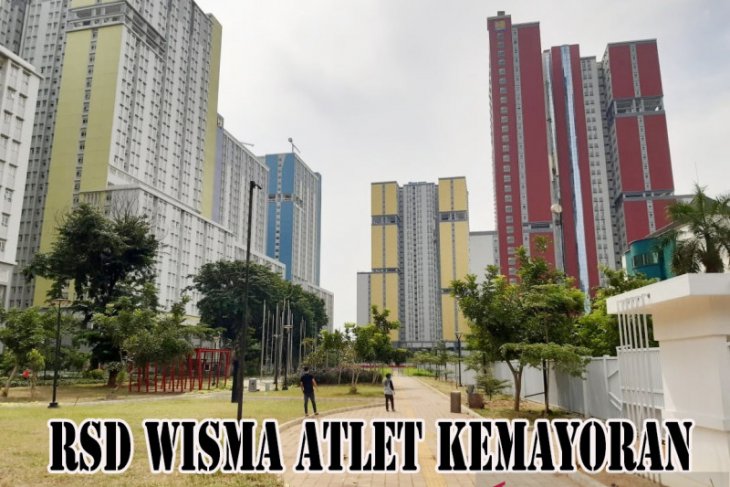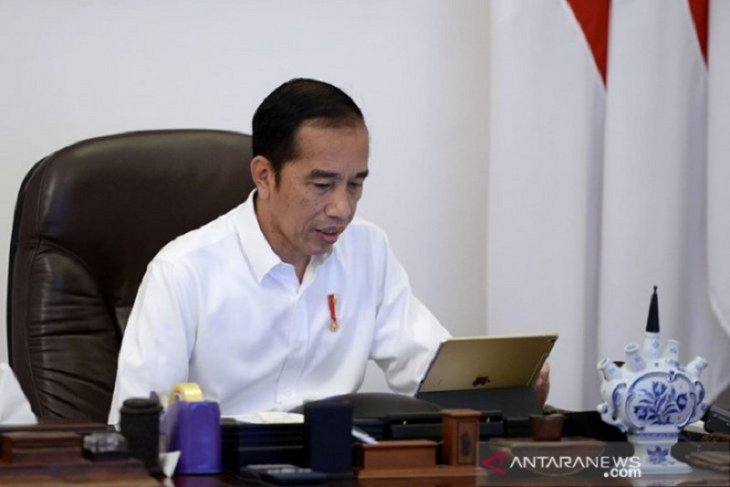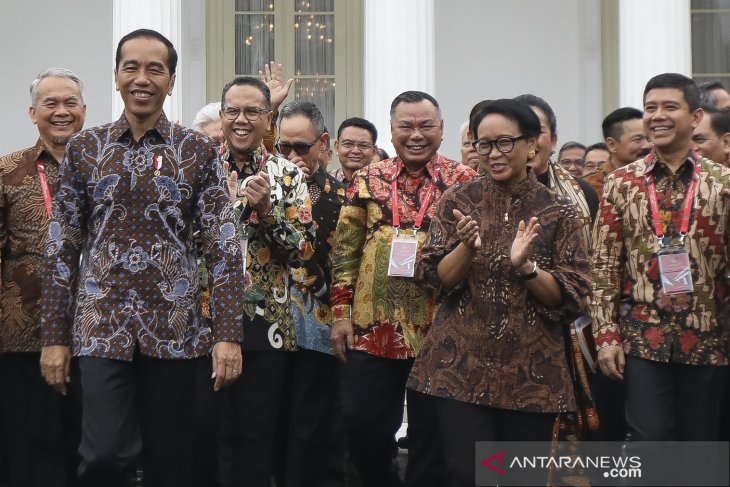Live Streaming
Program Highlight
Company Profile
May
Jakarta Emergency Hospital Records Recovery of 1,046 COVID-19 Patients
Written by Ani Hasanah
Wisma Atlet Emergency Hospital (RSD) in Kemayoran, Central Jakarta (ANTARA/ HO)
The Wisma Atlet Emergency Hospital (RSD) in Kemayoran, Central Jakarta, recorded that a total of 1,046 COVID-19 patients receiving treatment at the hospital recovered from the novel coronavirus disease, as of May 12, 2020.
The figure was the cumulative number of patients, who had recovered from the infection since March 23, 2020, head of the Wisma Atlet Hospital Vice Admiral Yudo Margono, concurrently commander of the Joint Regional Defense Command I, noted in a statement in Jakarta on Tuesday.
"Since March 23, 2020, a total of 2,233 patients had registered with the hospital, of which 1,046 were discharged (after recovering from the disease)," he remarked.
The Kemayoran Athlete's Village was converted to officially serve as a COVID-19 Emergency Hospital on March 23, 2020. The hospital has the capacity to accommodate 12 thousand patients.
Meanwhile, the COVID-19 Emergency Hospital on Galang Island in the province of Riau Islands also recorded eight recoveries, thereby bringing the count of inpatients at the hospital to 14, from 22 earlier.
"No COVID-19 patient is treated. The number of PDPs (patients under surveillance) reaches 11, while there are three ODPs (people under surveillance)," he noted.
The COVID-19 Emergency Hospital on Galang Island, equipped with 340 observation rooms and 20 isolation rooms, prioritizes Indonesian migrant workers and patients that have recently arrived from abroad.
In the meantime, based on data from the Task Force for the Acceleration of COVID-19 Handling, until Monday (May 11), 10 provinces with the highest number of COVID-19 cases comprised DKI Jakarta with 5,276 cases, 1,536 in East Java, 1,493 in West Java, 980 in Central Java, 541 in Banten, 331 in West Nusa Tenggara, 314 in Bali, 299 in West Sumatra, 278 in South Sumatra, and 263 in South Kalimantan. (ANTARA)
Of the 10 provinces with a high number of COVID-19 cases, only DKI Jakarta, West Java, and West Sumatra had applied PSBB. (ANTARA)
May
Seven Provinces with High COVID-19 Cases not Applying PSBB: President
Written by Ani Hasanah Photo Archive. President Joko Widodo during a limited meeting via video teleconference from the Merdeka Palace, Jakarta, Friday (3/4/2020).
Photo Archive. President Joko Widodo during a limited meeting via video teleconference from the Merdeka Palace, Jakarta, Friday (3/4/2020).
President Joko Widodo drew attention to seven provinces, with a high number of COVID-19 cases that had not applied large-scale social restrictions (PSBB) to control the transmission of the coronavirus disease 2019 (COVID-19).
During a limited meeting on PSBB evaluations held via video teleconference from the Merdeka Palace, Jakarta, Tuesday, the president urged government officials to evaluate COVID-19 countermeasures in areas that had not applied PSBB and compare case developments in areas that had enforced PSBB with those that had yet to enact them.
Based on data from the Task Force for the Acceleration of COVID-19 Handling, until Monday (May 11), 10 provinces with the highest number of COVID-19 cases comprised DKI Jakarta with 5,276 cases, 1,536 in East Java, 1,493 in West Java, 980 in Central Java, 541 in Banten, 331 in West Nusa Tenggara, 314 in Bali, 299 in West Sumatra, 278 in South Sumatra, and 263 in South Kalimantan.
Of the 10 provinces with a high number of COVID-19 cases, only DKI Jakarta, West Java, and West Sumatra had applied PSBB.
"Seven other provinces have yet to apply PSBB. Hence, we also evaluate provinces, districts, and cities that do not impose PSBB but also apply physical distancing policies and enforce strict health protocols in their daily lives," the president explained.
During the limited meeting, Widodo stated that several provinces, districts, and cities had not yet implemented PSBB but still succeeded in lowering the transmission of COVID-19 by limiting community activities.
"This is since there is indeed innovation on the field by applying a policy model that restricts community activities in accordance with the context in their respective regions," he stated.
The president has urged relevant government agencies to conduct a comprehensive evaluation of the spread of COVID-19 throughout the regions, especially in areas that have not shown a decrease in the number of cases.
"Based on data of new cases before and after the implementation of PSBB, indeed if we see, the results vary by region," he noted.
Indonesia recorded 233 new cases of the novel coronavirus disease as of Monday, while the number of recoveries climbed by 183, from the previous day, government spokesperson for COVID-19 handling, Achmad Yurianto, had earlier stated.
As of 12 p.m. local time on May 11, 2020, the total number of patients recovering from the infection stood at 2,881, while the tally for confirmed COVID-19 cases reached 14,265 nationwide, with 373 cities and districts reporting coronavirus cases.
“The number of patients dying of the disease increased by 18 to reach 991," Yurianto noted during a daily virtual press briefing.
As of Monday, the health authorities tested 116,358 people using the polymerase chain reaction (PCR) as well as rapid test methods, with at least 102,093 people whose test results came negative for COVID-19.
Yurianto emphasized that the number of new cases cropping up on a daily basis indicated ongoing transmission among members of the community, as people were not well-isolated, and there were vulnerable groups at high risk of contracting the infection.
He urged people to comply with the government’s guidelines on social distancing to break the chain of COVID-19 spread, frequently wash hands, and wear masks.(ANTARA)
Four Key Points Draw Jokowi's Attention in Evaluating PSBB Application
Written by Ani HasanahPresident Joko Widodo deciphered four crucial points in the evaluation of the implementation of the large-scale social restrictions (PSBB) policy in the four provinces and 72 districts and cities.
"What I want to say is that we seek a detailed evaluation in districts and cities pertaining to data on the trend of whether new positive cases in each region applying the PSBB rose or decreased," President Widodo stated during the limited meeting held via videoconference from the Merdeka Palace, Jakarta, on Tuesday.
Based on the new cases, the president noted that the results before and after the implementation of PSBB were varied and differed across regions.
The head of state opined that this was since the implementation of PSBB was varied. Consequently, the number of new cases in regions had decreased gradually and consistently but not drastically, though there were areas where the number of cases had declined but had also not been consistent and still volatile.
"Moreover, in some areas, the addition of cases has not changed, as before the implementation of PSBB. Such aspects also need to be underlined," he stated.
The second surmise that the president drew was that of the 10 provinces with the most positive cases, only three -- DKI Jakarta, West Java, and West Sumatra -- had PSBB status, while seven other provinces were still non-PSBB.
Hence, evaluations were also conducted at the provincial and district/city levels that did not apply PSBB but implemented a physical distancing policy and strict health protocols in the people's day-to-day lives.
"A comparison should be drawn between PSBB and non-PSBB, as there are indeed innovations on the field by applying a policy model of restricting activities in the community adapted to the context of their respective regions," he stated.
According to the president, the third aspect was that the management of PSBB control was also expected to not become trapped in the administrative limits of the government.
"It also means agglomeration, handling large areas that are interconnected, so that inter-regional management is integrated. For instance, what Greater Jakarta has implemented is interrelated, so that social mobility arrangements from the community can be integrated and be better," he noted.
The president affirmed that the fourth vital aspect based on the Task Force’s data was that 70 percent of the positive cases were in Java, as well as 82 percent of mortality was also in Java.
The president also urged the Task Force to ensure that the COVID-19 pandemic is effectively brought under control in five provinces in Java, especially in the subsequent two weeks.
During the meeting, the president also sought to ease the PSBB in a careful manner and not hurriedly. (ANTARA)
May
Ambassadors Must Prioritize Cooperation, Intensify Economic Diplomacy
Written by Ani Hasanah
archive: President Jokowi, Foreign Minister Retno Marsudi and a number of Indonesian ambassadors. ANTARA FOTO




